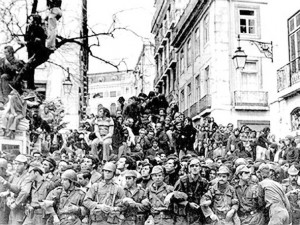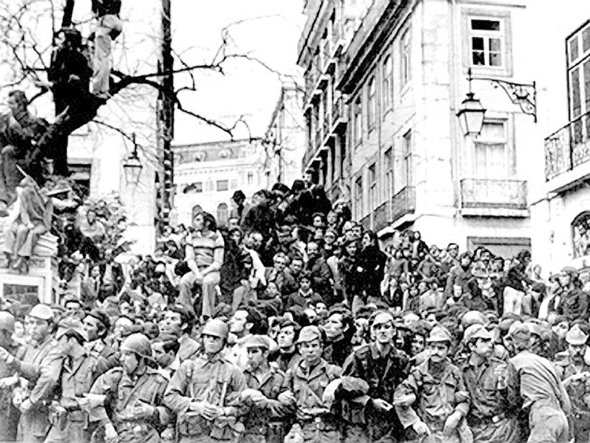 Today marks the 38th anniversary of one of the most inspiring and peaceful revolutions of the 20th century – The Portuguese Carnation Revolution. It was the 25th of April, 1974 when unlikely groups of low ranking soldiers from around the country disobeyed orders and took members of the brutal dictatorial regime prisoner. The soldiers had carried out and seen horrible acts during brutal colonial wars pursued by the Portuguese fascist state. The country itself was drained of its resources and had become a place characterized by poverty and a constant fear of being arrested, tortured or killed by the authorities. Despite failed revolution attempts before the 25th, the low ranking officers along with regular people throughout the country, took to the streets, daring to march, speak out for human rights, and defy their government. A gamble that risked everything, but paid off – concepts like social justice, equality, democracy, and peace, seemed to win a wave of victories that day and in the days following. A level of success that few countries have ever known in the wake of revolution, then and now.
Today marks the 38th anniversary of one of the most inspiring and peaceful revolutions of the 20th century – The Portuguese Carnation Revolution. It was the 25th of April, 1974 when unlikely groups of low ranking soldiers from around the country disobeyed orders and took members of the brutal dictatorial regime prisoner. The soldiers had carried out and seen horrible acts during brutal colonial wars pursued by the Portuguese fascist state. The country itself was drained of its resources and had become a place characterized by poverty and a constant fear of being arrested, tortured or killed by the authorities. Despite failed revolution attempts before the 25th, the low ranking officers along with regular people throughout the country, took to the streets, daring to march, speak out for human rights, and defy their government. A gamble that risked everything, but paid off – concepts like social justice, equality, democracy, and peace, seemed to win a wave of victories that day and in the days following. A level of success that few countries have ever known in the wake of revolution, then and now.
Having not been alive in 1974, yet still being surrounded throughout my life by people who were involved or who witnessed this unique moment in history, my understanding of the carnation revolution is shaped by the stories. And as we all know, stories can be inspiring, and yes – even exaggerated at times. But from all the stories I have ever heard of the 25 of April, what I am most left with is a profound awe and jealously for what people in those days lived through. Awe for obvious reasons; the massive challenge and tremendous risk these soldiers and ordinary people undertook. The outpouring of love and care for one another in the streets, despite all the fear and pain that had so recently been a reality. Jealously; to never have lived in such a fantastic moment of action and initiative. To see and be a part of a movement that ended wars, experience the rebirth of freedom of expression, shaking free of the economic and political structures that held the country hostage for decades.
These days we point to the arab spring as a source of possible inspiration, though even the immediate future for those nations remains cloudy. Some of us talk about occupy like the beginning of something significant, that could bring real change to a situation that is screaming out to be addressed. One day both of these may be looked back on as the verified beginnings of something great. But right now I would put them on historical probation, pending future developments and historical analysis. Overall I would say the 21st century (so far) is marked more by taking two steps back for every one step forward towards peace, love, and understanding. Perhaps there was a hopeful but cautious independent journalist back in the 70’s who observed the same thing.
Portugal in 1974 remains an era I wish I could have lived through. An era where things actually changed and you could see them change and run down the list of successes and of course failures. In the years and decades that would follow, some hopes and promises never came true. Others have been eroded by new economic and political waves. Portugal now finds itself with a laundry list of problems that make it hard to cheer or sing about the goals of the past. But if we talk about significant moments in history, where the forces of open mindedness and social justice won the day and got to put policies into practice on a real scale- for me its April 25th, 1974 that wins every time. What a fantastic time it must have been.
